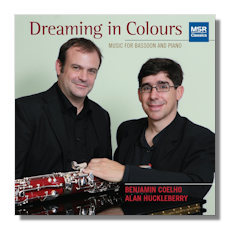
The Internet's Premier Classical Music Source
Related Links
- Schickele Reviews
- Latest Reviews
- More Reviews
-
By Composer
-
Collections
DVD & Blu-ray
Books
Concert Reviews
Articles/Interviews
Software
Audio
Search Amazon
Recommended Links
Site News
 CD Review
CD Review
Benjamin Coelho

Dreaming in Colours
- Peter Schickele: Summer Serenade
- John Steinmetz: Suite from an Imaginary Opera
- Drake Mabry: Duo for Bassoon & Piano
- Paul Jelescu: Suite Dobrogeana
- Jose Siqueira: 3 Etüden for Bassoon & Piano
- HyeKyung Lee: Dreaming in Colours
Benjamin Coelho, bassoon
Alan Huckleberry, piano
MSR Classics MS1340 69:57
Summary for the Busy Executive: The cello of the winds.
Since the Baroque, composers have left the bassoon out in the cold. Mozart, Beethoven, or Brahms never wrote a major work for the instrument, for example. Bassoonists must either transcribe pieces for other instruments or grit their teeth and tackle pieces from the Modern era and beyond.
Bassoonist Benjamin Coelho has made some terrific transcriptions, which you can hear on MSR 1237. The program on this CD shows Coelho pursuing the second path. Although I doubt any of these works will penetrate outside the narrow community of performers, they are all at least attractive, and they all give the bassoon a role other than "clown prince."
The public, of course, knows Peter Schickele as a musical comedian, the chief editor and champion of P.D.Q. Bach, the last and oddest of Bach's twenty-odd children. However, he has always been a composer in his own right, and his instrument is the bassoon. I associate Schickele's music with the Sixties, in that it picks freely from among folk, pop, jazz, Renaissance, and classical inspirations. Very few composers can claim Roy Harris and Spike Jones as their musical idols. Schickele's own voice strikes me as a lyrical one, although I emphasize that I've heard very few pieces, with Pentangle for horn and orchestra the largest of them. Summer Serenade has three movements: "Dreams," "Games," and "Songs and Dances." "Dreams" begins with a breathtakingly beautiful melody, emphasizing the bassoon's singing quality. Both Coelho and his accompanist, Alan Huckleberry, put out what seems an endlessly spinning line. However, the music shifts to something like hard bop, which requires both players to count beats like crazy, before the opening enchantment returns. "Games" mixes meters, as if deliberately trying to make the players break down. It reminded me of a video game at one of the higher levels. "Songs and Dances" continues the mixed-meter fun, with a rambunctious outside and a relaxed, even melancholy middle. Overall, a lovely work, full of high-quality invention.
John Steinmetz, also a bassoonist, contributes a suite he calls "an imaginary opera." Accordingly, we get a dramatic opening, recitative, arias, ballets, even duets. The suite moves from darkness to light, switching direction after the midpoint. Steinmetz writes mainly vocally and has, I think, a vivid theatrical imagination. The only thing missing from the opera, other than voices, is dramatic conflict.
Oboist Drake Mabry, long resident in France, studied oboe with Harold Gomberg and composition with Krzysztof Penderecki. The Duo, a long, serious work in one movement, takes very large risks, particularly with building such long spans of argument that they might collapse. Nevertheless, it doesn't happen. The idiom sounds a bit like Penderecki, although Penderecki has no one idiom. This leans toward the "hard Modern" Penderecki. I should say instead that if you had told me Penderecki had written it, you wouldn't have surprised me.
Rumanian composer Paul Jelescu studied in France. His music incorporates folk elements. The Rapsodie Dobrogeana pays homage to the music of a region shared by Rumania and Bulgaria. Its modesty works against it if you listen to it right after the Mabry, so I don't recommend that. Nevertheless, it has its attractions.
Although born in Portugal, José Siqueira, the earliest composer here and the only one no longer alive, is a Brazilian nationalist in the mold of Villa-Lobos. I wish I knew more Brazilian dances than the samba, because I could then tell you more about each of the three etude. The first is a lazy dance, the second a slow song. Both move along elegantly, subtly syncopated. The third bubbles along, with strong, unusual harmonies for extra spice.
I looked at the title of Hye-Kyung Lee's Dreaming in Colours, and my jaw clenched. I'm not a big fan of most music that takes its inspiration from painting because usually such scores just lay there in a wad, more concerned with shifting texture than with shaping time – after all, what music at its most basic does. I needlessly raised my blood pressure. Move is exactly what this piece does, throughout its three movements: "Shades of Blue," "Old Rose," "Pale Yellow – Dark Red." I don't get the connections between the titles and their music. I suspect Lee is someone who can see colors when she hears music – a synaesthesiast. Unfortunately, even among those so gifted, the color-sound association varies. Although I haven't that facility myself, I would have named the movements "Angry Red," "Anxious Purple," and "Acid Green." The music, trenchantly dramatic, easily sweeps all these nits aside. My favorite movement, the third, alternates effortless counterpoint with mixed-meter unisons.
In this program, Coelho hasn't quite the room to stretch out as he did in his transcription album. The music here doesn't particularly highlight the soloist but instead stresses the collaboration with the piano. Here, Coelho and Huckleberry shine. Their ensemble nears perfect unanimity among a wide range of musical idioms. They not only can do the darker stuff, like the Mabry and Lee, but the lighter stuff as well without condescension. I love them in the Schickele (probably my favorite piece on the program) and in the Siqueira, where they conjure up perfect dancing partners. A very attractive disc.
Copyright © 2013, Steve Schwartz




















